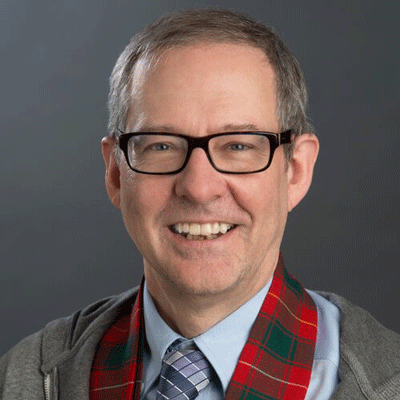A theologian is one who is ‘disposed to pray,’ the Rev. Dr. Robert Cathey says in ‘Everyday God-talk’ episode
by Beth Waltemath | Presbyterian News Service

The Rev. Dr. Robert Cathey
“One of the ancient definitions of the theologian is that the theologian is the one who prays,” said the Rev. Dr. Robert Cathey, professor emeritus of theology from McCormick Theological Seminary, during the fifth and final episode of this season of “Everyday God-talk,” a web video series from the Office of Theology and Worship.
Cathey explained that the definition comes from Eastern Orthodoxy and the understanding that theology is more than speculation and doctrinal exploration. “It’s also about preparing oneself, to be better in prayer, to be better prepared for prayer, to be disposed to pray.” Disposing himself for prayer is a practice Cathey has learned through managing osteoporosis with yoga and through the letting-go process of retirement.
In the series of episodes, Cathey discusses with the Rev. Dr. So Jung Kim the various types of self-giving that come from using the body to calm an overactive mind, in moving out of one’s office and with reframing goals attached to silent retreats.
“One of the things my spiritual director said to me is that even when we’re in prayer and meditation and nothing specifically happens, we are also in the process of opening ourselves to the communication of God,” Cathey said as he described a three-day retreat he took to be in discernment. “That retreat in which nothing seemed to happen to me when I was asking for direction actually was the time when I was becoming open for the opportunity to retire in a way I hadn’t expected before.” A few weeks later, Cathey and his wife, Barbara, who was featured in the fourth episode of this season of “Everyday God-talk,” learned it was financially possible for them to retire at the same time, putting into motion their dreams and plans for a new season of life.
In the second part of Cathey’s interview, he discusses the importance of regular times to pray and to contemplate the eternal nature of God amid an attunement to the passage of time. A sabbatical in Beirut during his McCormick years prompted him to say the Lord’s Prayer five times a day when the call to prayer rang from the minarets. In retirement, Cathey designates 20 minutes each morning to sit facing a picture window for contemplative prayer. Watching the same trees change from leaf-laden to bare to snow-covered to blossoming marks his change from a busy professor who only registered the extremes of weather to an urban-styled Thoreau attuned to the will of the seasons on his square of the earth.
“One of the stories about Henry David Thoreau, which I found fascinating, was he would walk in the same path every day, 365 days a year, and just observe what he found along the path. He saw the seasons change,” said Cathey. “Part of self-care is helping your body be more in sync with the seasons and the change of time that are recorded by the seasons.”
In the final part of the interview, Cathey describes a hope that theological education may become more than an intellectual pursuit but also a journey of spiritual formation. According to Cathey, our relationship to the spaces and objects that surround us and how we relate to theological texts in these spaces affect the formation of mind and spirit. After purging his office of a career’s worth of teaching materials and beloved books, Cathey compared the process of detachment to “turning things over to the providence of God.” He is reminded of a practice he took up in seminary to read primary texts in chapels and places of worship in order to read them for more than intellectual purposes but “to get a sense of the spirit of the book.”

The Rev. Dr. So Jung Kim (Contributed photo)
“So often I find that changing the setting in which we read a text, or which we talk about a text, can make a big difference in our appreciation,” said Cathey, who illustrated throughout his conversation with Kim the many ways that the transitions of retirement offer new space and more time for deeper spiritual formation.
Kim expresses gratitude for the generosity of time and spirit of her guests of this season’s Everyday God-talk and announces that the initiative will take a “hiatus for the summer and will return after the summer with a new format and platform.”
![]() You may freely reuse and distribute this article in its entirety for non-commercial purposes in any medium. Please include author attribution, photography credits, and a link to the original article. This work is licensed under a Creative Commons Attribution-NonCommercial-NoDeratives 4.0 International License.
You may freely reuse and distribute this article in its entirety for non-commercial purposes in any medium. Please include author attribution, photography credits, and a link to the original article. This work is licensed under a Creative Commons Attribution-NonCommercial-NoDeratives 4.0 International License.